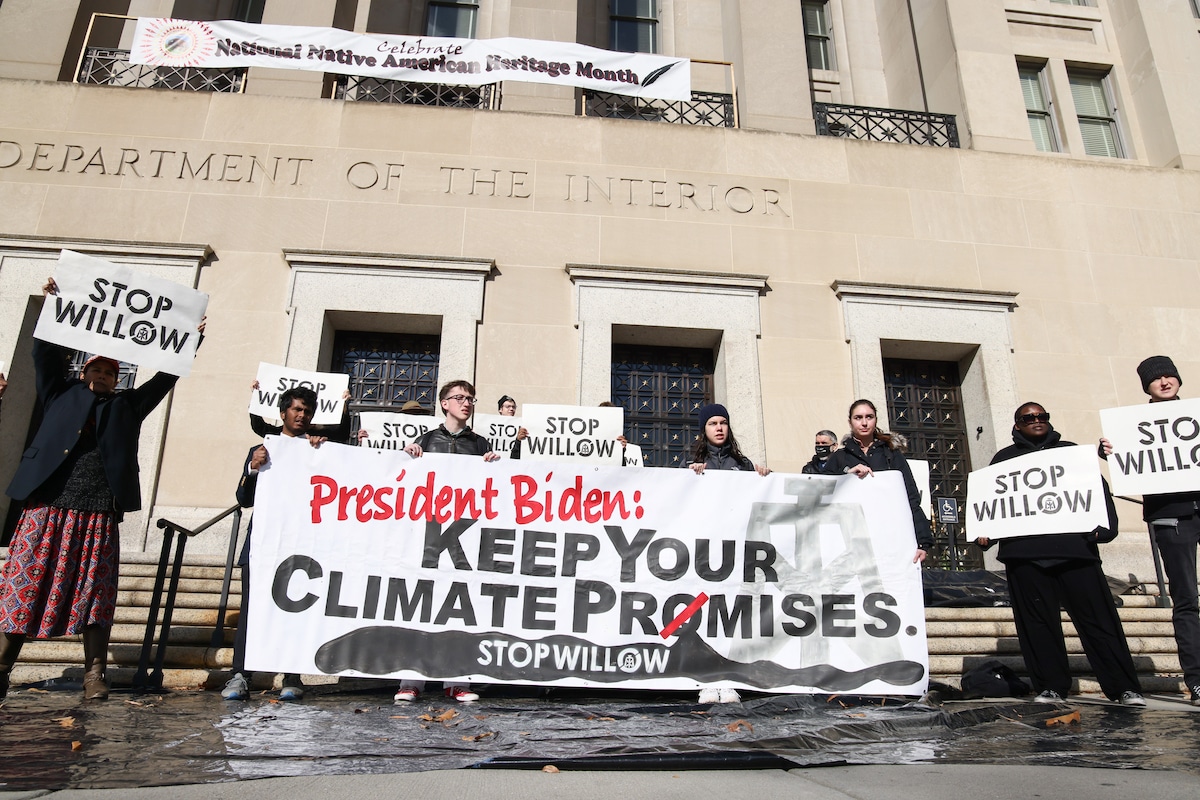Products You May Like
Climate activists hold a demonstration to urge President Biden to reject the Willow Project at the U.S. Department of Interior in Washington, DC on Nov. 17, 2022. Jemal Countess / Getty Images for Sunrise AU
 Why you can trust us
Why you can trust us
Founded in 2005 as an Ohio-based environmental newspaper, EcoWatch is a digital platform dedicated to publishing quality, science-based content on environmental issues, causes, and solutions.
With 161.5 million views and counting on TikTok alone, the #StopWillow social media campaign has left no question of the groundswell of opposition to the proposed oil development project Willow on Alaska’s remote North Slope.
Social media users have been using the hashtag to voice their resistance to President Joe Biden’s failure to keep his campaign pledges to reduce oil drilling.
“With all of the progress that the U.S. government has made on climate change, it now feels like they’re turning their backs by allowing Willow to go through,” said climate activist Hazel Thayer, who posted TikTok videos using the #StopWillow hashtag, as The Associated Press reported. “I think a lot of young people are feeling a little bit betrayed by that.”
More From EcoWatch
Final approval of the Willow project lies with Secretary of the Interior Deb Haaland, who opposed the Willow project and fought against it as a member of Congress. There is likely to be input on the final decision from top White House climate officials, as well as President Biden himself.
Climate activists have called the Willow project a “carbon bomb,” and a change.org petition had more than 3.1 million signatures, with a goal of 4.5 million.
According to ConocoPhillips Alaska, the Willow project — which would be located on the Indiana-sized National Petroleum Reserve — could produce about 1.5 percent of the total oil production in the U.S., or as much as 180,000 barrels of oil per day, reported The Associated Press.
“Willow would emit more climate pollution annually than more than 99.7% of all single point sources in the country. It’s estimated that the oil from Willow, when burned, would add more than 280 million metric tons of climate pollution to the atmosphere over the next 30 years — equivalent to the annual emissions from 76 coal-fired power plants,” the Stop Willow website says.
According to Audubon Alaska, the Willow project would be located near the Teshekpuk Lake wetlands, an important “safe haven” for nesting yellow-billed loons and molting geese.
“The Willow project raises a number of serious issues, including impacts to migrating caribou, anadromous fish, nesting Yellow-billed Loons, and the Indigenous Peoples who call this area home,” reported Audubon Alaska.
Quannah Chasinghorse, who is a climate activist, Han Gwich’in and Sicangu/Oglala Lakota land protector and fashion model from Eagle Village, Alaska, and the Tribes of South Dakota, voiced her opposition of the Willow project in an opinion piece in CNN.
“As someone whose homelands are in Alaska and who has experienced firsthand the impacts of climate change, the threat this massive and destructive project creates hits close to home for me. I have been inspired by the bravery of the community of Nuiqsut, Alaska, who are speaking out against the project, which is just miles from their homelands, threatening their way of life, food security and wellness,” Chasinghorse wrote.
Rosemary Ahtuangaruak, who is mayor of Nuiqsut, the closest community to the area of the proposed Willow project, voiced the community’s opposition to the project because of how it could affect their subsistence lifestyle, The Associated Press reported.
“And while this project may be across the Brooks Range from my people, the ecosystems and wildlife of these landscapes do not know western boundaries. Pollution and contamination do not know western boundaries. This project could destroy vital habitat for native species, like the caribou. Nuiqsut is fighting for these lands because they are also fighting on behalf of the caribou, the same food source I grew up eating,” Chasinghorse wrote in CNN.
Subscribe to get exclusive updates in our daily newsletter!
By signing up, you agree to the Terms of Use and Privacy Policy & to receive electronic communications from EcoWatch Media Group, which may include marketing promotions, advertisements and sponsored content.
